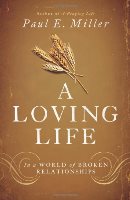Reviewed by J. Stephen Yuille
What is love? For many in our day, love is strictly the stuff of Hallmark cards and movies. It’s a warm, fuzzy feeling that defies explanation. It’s an overwhelming emotion that people helplessly follow because the heart has reasons the mind never understands.
But what happens when this notion of love collides with the equally entrenched notion that the supreme goal of life is to feel happy? In other words, what happens to this kind of love when it encounters negative feelings such as pain and sorrow, or negative experiences such as denial and sacrifice? For many people, the answer is obvious: they must not be in love anymore, and they must uproot in order to remain true to themselves.
Could anything be more antithetical to biblical love?
In A Loving Life in a World of Broken Relationships, Paul Miller takes us on a journey of hesed (steadfast) love. He does so by leading us through the Book of Ruth, peeling back the layers of this ancient story to provide a beautiful picture of Christ’s love for His people.
A Compelling Story
Miller does a masterful job of expounding the text, unpacking the historical and cultural context, and highlighting the literary nuances, while at the same time conveying Naomi’s heartbreaking loss and Ruth’s heartwarming devotion. He reveals the nature of hesed love in Ruth’s unwavering commitment to Naomi. Ruth loves Naomi in such a way that she limits and restricts her own life. She loves Naomi in such a way that she sacrifices her own dreams and interests. She loves Naomi in such a way that she suffers insecurity and uncertainty. She loves Naomi in such a way that she persists even in the face of Naomi’s casual indifference. In short, Ruth demonstrates that “hesed love is one way love […] a love without an exit strategy” (p. 24).
A Challenging Story
Miller makes it clear that this kind of love is antithetical to “the spirit of our age” (p. 25). Most of us assume that we must act on our feelings. Therefore, when love becomes costly, we usually respond by pursuing an exit strategy or creating a false reality. But the story of Ruth shows us that, when love becomes costly, we must act on our commitments. This mindset is impossible unless we embrace the fact that, when we love, we disappear (p. 135). That is to say, when we’re captivated with the object of our love, we don’t want to be seen. This necessarily means that love and pride are antithetical. Miller states that the great barrier to love is ego – the life of the self (p. 19). In order to love, therefore, we must die to self.
A Comforting Story
Miller demonstrates how Ruth’s selfless love ultimately points us to Christ, thereby making her “the Christ figure, the one who dies so others may live” (p. 152, italics mine). In my opinion, Miller overstates his case ever so slightly. Surely, Boaz is a Christ figure. Like Boaz, Christ pays the ultimate price to purchase us – outsiders, who stand in need of a kinsman-redeemer. Personally, I would rather Miller had referred to Ruth as a Christ figure instead of the Christ figure. That being said, his point is well made; namely, Ruth’s “complete absence of self reflects the mind of Christ” (p. 155). Because of hesed love, Christ left a glorious crown, walked in our flesh, and took our infirmities; He gave sight to the blind, speech to the mute, and life to the dead. Because of hesed love, He was hungry, thirsty, and weary; He was betrayed, arrested, and condemned; He was sorrowful unto death. Because of hesed love, He climbed a shameful cross to bear our guilt and shame. Christ’s love for His people is steadfast.
Recommendation
Miller upholds this hesed love as the necessary alternative to the many false views of love so prevalent in our day. He includes numerous stories and anecdotes in his exposition, drawing from the deep well of personal and pastoral experience. His insights will prove beneficial to all, particularly those who are struggling with the difficult reality of broken and burdensome relationships. I highly recommend A Loving Life to you.
Dr. J. Stephen Yuille is Pastor of Grace Community Church, Glen Rose, TX, Director of Baptist Studies at Redeemer Theological Seminary, Dallas, TX, and Book Review Editor for Spirituality and Christian Living here at Books At a Glance.
